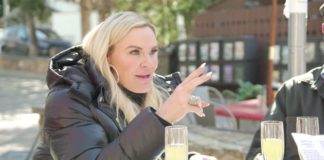“I’m 75 years old and I came out as a gay man two years ago,” says Jim Kisthardt an LGBTQ+ senior who only came out after his wife of 51 years passed away in 2020.
Coming out is never easy but before the 1960s, it was still illegal to be gay.
“Times were very different. Being gay would be a curse. Being gay was one of the worst things you could bring to your family, worse than divorce,” Kisthardt says.
He said that people who came out in the 1950s and 1960s would be ostracized and would have to move away.
VIDEO: Best moments from 2022 SF Pride Parade and Celebration
He said telling his parents in those days was never an option.
“I just thought it would’ve killed them so no, I put that out of my mind entirely,” he says.
It was only in July 1961 that Illinois became the first state to decriminalize homosexuality by repealing its sodomy laws.
Even as recently as 1952, the American Psychiatric Association diagnosed homosexuality as a sociopathic personality disturbance.
In the mid-1970s, Rae Lynne Black wanted to join her local county sheriff’s department.
“I actually made it to the department and of course, as soon as they found out that I was living with a woman, they decided that they had to send me to a psychiatrist to make sure that I wasn’t gay. At that point in time, I decided this is not something I want to put up with for the rest of my working career. So I decided that I would not become a police officer and I left the academy,” she said.
RELATED: What do LGBTQ and LGBTQIA+ mean?
Sharon Long and Rae Lynne Black met in college at California State University Long Beach but had to keep an extremely low profile on their relationship for most of their lives.
“I never really just came out and told somebody I’m gay,” Long says.
On September 6, 2005, California became the first state to pass a bill allowing marriage between same-sex couples.
The couple got married a few years after.
“We’ve been together for 46 years. We got married in 2008,” Long says.
“I kept crying through the whole thing because I never thought we’d be able to ever get married. So it was tears of joy. The woman who married us kept saying you got to stop crying, you’re gonna make me cry.”
All three seniors now live in Fountaingrove Lodge, the nation’s first LGBTQ+ and ally retirement community.
LGBTQ+ senior housing wasn’t even an option before 2014, when Fountaingrove Lodge opened its doors in Santa Rosa, California.
Are LGBT people coming out younger these days?
Crimson, who is 21 came out when she was 14 years old.
They began coming out to friends and family in their early teens and found a lot of love and support.
“I knew I would never lose my job over being gay which is something I’m really grateful for because I know generations before me didn’t have that privilege. So it’s been really awesome to not have to worry so much about that side of things in my coming out experience,” they say.
Crimson’s grandmother and grandaunt who are gay had a harder time.
“There was a lot of tension in the family,” they say.
RELATED: Chicago non-binary couple faces unique set of challenges
Ryan Hundley, 38, a San Francisco-based gay man who came out 21 years old, thinks things are easier now than they were 50 years ago.
“50 years ago, queer people could be fired, they could be kicked out of their homes, their lives could really be in danger and I think that was a pretty common experience,” Hundley says.
Hundley had a largely positive experience and says he got nothing but love and support.
However, he acknowledges that many teenagers that come out even today face being ostracized by their communities or face homelessness because they came out to their families.
“So I think there’s been a lot of progress. But there’s also, unfortunately, still a lot of work to go,” he says.
Rob McDowell, 33, who currently lives in San Francisco, came out as gay at 15 years old. He grew up in a small town in Pennsylvania and often had to hold his breath in public spaces and when meeting new groups of people in his mid-late teens and early 20s to make sure he was safe.
“I often got harassed and I often got ridiculed,” he said.
“I was in a church situation at that time and I kind of got shunned for lack of a better term. So you could say some good things and some not-so-good things have happened to me,” he said.
McDowell’s coming out experience was difficult and uneven, as he felt he had to come out multiple times to people throughout his life but a recent visit to his hometown showed that things are changing rapidly.
Inclusivity signs were displayed in the windows of local businesses, declaring they were safe spaces for LGBTQ+ people, something Rob says his younger self would have loved to have.
“I do think things are changing and I think it’s changing because we are creating more safe spaces for LGBT folks and allowing representation that shows different types of gay people throughout the world,” he says.
Hope for the future
“People can still be killed because of being LGBT in certain countries. And until those types of things change, and until we start condemning them as a whole global community, I do think that people will never totally be safe. I also think that we need to make sure we’re showing we’re representing all different types of LGBT folks in our entertainment and in our media representation. That really matters,” McDowell says.
This was echoed by others.
“I think LGBT people are going to need to fight hard to maintain the progress we’ve made the rights that we’ve we’ve fought so hard for a while making sure we’re bringing everyone in our community along. And what is your hope for pride this year,” Hundley says.
” I have so much hope for the generation after me. Each generation is getting more and more progressive and accepting. There’s more and more positive representation,” Crimson says.
RELATED: With Roe dead, some fear rollback of LGBTQ+ and other rights
Long says the thing she would like to see changed is for parents of LGBTQ+ youth to not turn their kids out of their homes.
“Yet still, there are many homeless youth, because their parents have rejected them. And that should not be going on today. That’s something that has to be corrected in society,” she says.
These days, Kisthardt is optimistic.
“I am trying to make up for lost time. I hopefully have 20 good years left if I take care of myself and stop breaking bones. I’ve been putting myself out there going to various groups of gay guys trying to meet people and associate with people who understand me and it’s been helpful,” he says.

If you’re on the ABC7 News app, click here to watch live
Copyright © 2022 KGO-TV. All Rights Reserved.








